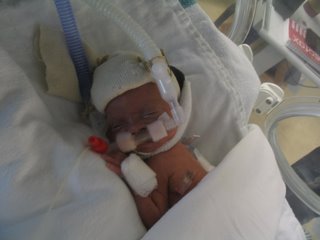

Update #4 on Isabella Rose - March 12, 2006 - 33 Days Old - Gestational Age: 29 Weeks +2 Days
Ladies and Gentlemen…..for Best Actress in a Medical Drama, the Oscar goes to…..Isabella!
Ok, so maybe she’s not acting, but Isabella has handed in another great, very dramatic performance this week.
She started off with plenty of gusto. On Tuesday, the doctors were able to remove Isabella’s “deep line”, which snaked internally from her left arm all the way to her heart, delivering both nutrition and medicine. These deep lines, while crucial, can be very dangerous. They are highly susceptible to infection and course “deep” inside the body, carrying an infection to those parts where it can do the most damage. The nurses told us to be thankful that it was out of her and we were.
Also on Tuesday, Isabella had a head sonogram that showed that her brain bleed, which occurred shortly after her birth, was resolving itself. Almost all preemies have brain bleeds (called Intraventricular Hemorrhages or IVHs) that are graded on a scale of 1 to 4, with 4 being the most severe. Isabella had a grade 1 bleed, which usually resolves itself with little or no permanent damage; a grade 4 bleed almost always involves a serious permanent disability. An IVH is untreatable; the doctors can only wait and see to what extent it resolves itself or worsens over the first few weeks of a baby’s life. When Isabella was two days’ old, her doctor told us that he was “thrilled” with her Grade 1 IVH, since very small preemies like her usually have the worst bleeds. Who knew you could be “thrilled” with any kind of brain bleed?
With all of this progress, there was talk of Isabella possibly coming off her CPAP by the end of the week. We continued Kangaroo Care and on Tuesday I held her against my chest for almost an hour! It was a good
day.
How quickly things can change.
Every morning, right after we open our eyes and before our feet touch the floor, we call the NICU to find out if Isabella has had a good night. Usually we’re told “she’s doing fine”, “she’s great”, or “she’s been a good girl”. Wednesday morning the nurse paused and said, “Isabella had a rough night”. After averaging 3-6 events each 24-hour period over the last week, she had suffered a staggering nine events between midnight and 6.a.m. During these events, either her heart stopped beating, she stopped breathing, her oxygen levels dropped below normal, or a combination of the three. Something was definitely wrong.
By the time I got to the hospital, there were two doctors and a nurse huddled over her isolette, and they all looked worried. They told me that although her blood work was normal, Isabella was not acting herself. “You can’t just look at the objective data,” they said, “it can lie - sometimes you just need to look at the baby”. And so we did. Isabella’s color had gone from pink to gray. Her face was often in a wince and her brow was furrowed; they told me this meant that she was probably in pain. She no longer kicked her legs when the nurse changed her diaper.
She didn’t move her head when they adjusted her CPAP prongs or flail her arms when they massaged her chest. Nicole, her nurse, picked up Isabella’s arm and told me to watch as it flopped, lifeless, back down to her side. It was a terrible moment.
They turned up Isabella's ventilator and gave her supplemental breaths and extra oxygen –after fighting for four weeks to make progress on that ventilator, Isabella was taking steps backward. Before I left that day, the doctors were convinced that it was most likely an infection, so they started intravenous antibiotics. Since Isabella was born, the doctors and nurses had been warning us that every baby in the NICU
gets at least one, if not several, infections before they go home – now it was her turn. An infection can cause major complications and, in the preemie manual they gave us on our first day in the NICU, it said
that 25% of infected preemies don’t survive. I was used to saying goodbye to Isabella every afternoon, knowing that she was a small, but stable baby. But that day, I had to leave our sick little girl behind
and it was a terrible feeling.
Thursday morning there was more bad news. Overnight, Isabella’s episodes had increased and were now clustered, and her 4 a.m. blood work confirmed an infection. I called Patrick; he was away on a
business trip and booked a flight home immediately. But again, by the time I had gotten to the hospital, just a few hours later, things had changed - this time for the good.
Despite her earlier, ominous blood work, Isabella was looking better. "Sometimes, you just have to look at the baby," they were still saying, but this time with smiles on their faces. The antibiotics had kicked in
and Isabella was getting back to herself-pinker, and a little feistier. By the time Patrick reached the hospital, we were able to cautiously celebrate.
Isabella is now back to her four-and-a-half-week-old self. She is bright pink and very active, her face sweet and calm, and when she's sleeping, she looks peaceful and comfortable. She weighs a scale-bending 935 grams or 2.05 lbs, and no longer requires intravenous fluids. She gets 16 ccs of formula every 3 hours.
The doctors won't allow us to do Kangaroo Care for a few days, until they know that all of her blood work is, and will remain, completely normal.
Next week we're hoping Isabella gives up the melodrama and tries her hand at comedy. We could all use a few laughs.
Thanks for all of your good thoughts!
Much love,
Marcia, Patrick & Jade
P.S. Enjoy the pictures.

0 Comments:
Post a Comment
<< Home